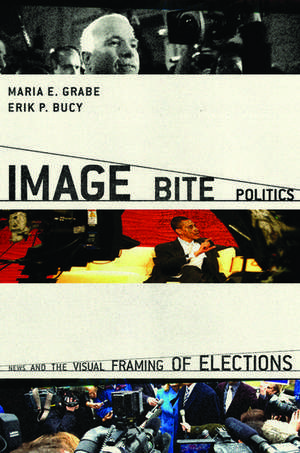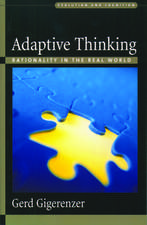Image Bite Politics: News and the Visual Framing of Elections: Series in Political Psychology
Autor Maria Elizabeth Grabe, Erik Page Bucyen Limba Engleză Hardback – 19 mar 2009
Din seria Series in Political Psychology
- 28%
 Preț: 492.69 lei
Preț: 492.69 lei - 22%
 Preț: 452.32 lei
Preț: 452.32 lei - 27%
 Preț: 339.78 lei
Preț: 339.78 lei - 27%
 Preț: 395.34 lei
Preț: 395.34 lei - 34%
 Preț: 520.19 lei
Preț: 520.19 lei - 31%
 Preț: 428.94 lei
Preț: 428.94 lei - 31%
 Preț: 384.83 lei
Preț: 384.83 lei - 33%
 Preț: 558.53 lei
Preț: 558.53 lei - 34%
 Preț: 947.50 lei
Preț: 947.50 lei - 31%
 Preț: 348.36 lei
Preț: 348.36 lei - 30%
 Preț: 492.00 lei
Preț: 492.00 lei - 24%
 Preț: 253.16 lei
Preț: 253.16 lei - 34%
 Preț: 576.77 lei
Preț: 576.77 lei - 30%
 Preț: 520.86 lei
Preț: 520.86 lei - 30%
 Preț: 340.89 lei
Preț: 340.89 lei - 18%
 Preț: 297.76 lei
Preț: 297.76 lei - 21%
 Preț: 538.20 lei
Preț: 538.20 lei - 27%
 Preț: 402.18 lei
Preț: 402.18 lei
Preț: 330.17 lei
Preț vechi: 423.06 lei
-22% Nou
Puncte Express: 495
Preț estimativ în valută:
63.18€ • 66.14$ • 52.28£
63.18€ • 66.14$ • 52.28£
Carte tipărită la comandă
Livrare economică 26 martie-01 aprilie
Preluare comenzi: 021 569.72.76
Specificații
ISBN-13: 9780195372076
ISBN-10: 0195372077
Pagini: 344
Ilustrații: 64 halftones, 24 line drawings
Dimensiuni: 236 x 163 x 25 mm
Greutate: 0.59 kg
Editura: Oxford University Press
Colecția OUP USA
Seria Series in Political Psychology
Locul publicării:New York, United States
ISBN-10: 0195372077
Pagini: 344
Ilustrații: 64 halftones, 24 line drawings
Dimensiuni: 236 x 163 x 25 mm
Greutate: 0.59 kg
Editura: Oxford University Press
Colecția OUP USA
Seria Series in Political Psychology
Locul publicării:New York, United States
Recenzii
This smoothly-written, data-rich book is a powerful reminder of the importance of visual images in politics. The authors' research taps into multiple literatures including communication, psychology, political science and biology to present an extraordinarily well-rounded analysis of visual framing of elections. This unique study is essential reading for anyone who wants to know how political communication actually works during major electoral contests.
Scholars and pundits have long acknowledged (and often lamented) the role of image in politics. Yet, systematic studies of image have been rare. This book not only fills that gap, but it also does so with unparalleled substantive and methodological rigor. It is sure to serve as a launching point for an entire field of study on image and politics.
Grabe and Bucy show how visual images convey information and demonstrate the impact images in news coverage inform and move the electorate. Image Bite Politics is thoughtful, carefully wrought, impressive and path breaking.
This volume presents an unusually detailed, extensively referenced and thoroughly researched argument for taking the visuals of television news seriously as a source of political information. Cogently and clearly written, it includes a broad sweep of the history of the development of the human eye and the brain in processing visual and verbal information as well as extensive data from four consecutive presidential elections. As such, it breaks with the tradition in most election studies of privileging the word over the image and takes the visual dimension of television more seriously than most scholars of politics have thus far. For those interested in the role of television and visual images in elections and political communication, this is an essential work.
Grabe and Bucy introduce contemporary neuroscience to the analysis of voters' perception and responses to the televised coverage of politics. Because emotional responses are more rapid than cognitive analysis and judgment, this approach shows why theories based on print communication or "rational choice" often fail to describe political life. It's past time that a scientific understanding of non-verbal cues and visual framing are integrated to a comprehensive assessment of television news, campaigns, and the emotional dimension of politics. The result is a book that should become a classic that is required reading throughout the political science discipline (and not just in studies of the role of media in American politics).
Scholars and pundits have long acknowledged (and often lamented) the role of image in politics. Yet, systematic studies of image have been rare. This book not only fills that gap, but it also does so with unparalleled substantive and methodological rigor. It is sure to serve as a launching point for an entire field of study on image and politics.
Grabe and Bucy show how visual images convey information and demonstrate the impact images in news coverage inform and move the electorate. Image Bite Politics is thoughtful, carefully wrought, impressive and path breaking.
This volume presents an unusually detailed, extensively referenced and thoroughly researched argument for taking the visuals of television news seriously as a source of political information. Cogently and clearly written, it includes a broad sweep of the history of the development of the human eye and the brain in processing visual and verbal information as well as extensive data from four consecutive presidential elections. As such, it breaks with the tradition in most election studies of privileging the word over the image and takes the visual dimension of television more seriously than most scholars of politics have thus far. For those interested in the role of television and visual images in elections and political communication, this is an essential work.
Grabe and Bucy introduce contemporary neuroscience to the analysis of voters' perception and responses to the televised coverage of politics. Because emotional responses are more rapid than cognitive analysis and judgment, this approach shows why theories based on print communication or "rational choice" often fail to describe political life. It's past time that a scientific understanding of non-verbal cues and visual framing are integrated to a comprehensive assessment of television news, campaigns, and the emotional dimension of politics. The result is a book that should become a classic that is required reading throughout the political science discipline (and not just in studies of the role of media in American politics).
Notă biografică
Maria Elizabeth Grabe is Associate Professor and Director of Graduate Studies in the Department of Telecommunications at Indiana University, Bloomington and a Research Associate of the Department of Political Sciences, University of Pretoria, South Africa. Erik Page Bucy is Associate Professor in the Department of Telecommunications and Adjunct Associate Professor in the Department of Political Science and School of Informatics at Indiana University, Bloomington.











